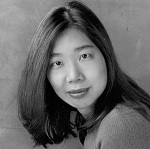 For last year’s conference, fiction and poetry assistant Jeannie Kim-McPherson penned this introduction to Lan Samantha Chang’s work.
For last year’s conference, fiction and poetry assistant Jeannie Kim-McPherson penned this introduction to Lan Samantha Chang’s work.
Lan Samantha Chang’s stories have appeared in The Atlantic and twice in The Best American Short Stories, and her books have won numerous awards and accolades, including the PEN Beyond Margins Award. She has received writing fellowships from The Guggenheim Foundation and the National Endowment for the Arts, among a long list of notable fellowships. A former Stegner Fellow, Sam is a graduate of the Iowa Writers’ Workshop, where she currently teaches and serves as director of the program.
Through her elegant prose, Sam often calls the reader into a seemingly uncharted landscape and unearths for us, to quote the LA Times, “a world within a world.” And the inner world we begin to discover reveals insight into our private psychology.
Whether we find ourselves, as in Hunger, in an immigrant family consumed and ultimately torn apart by music, or in a splintering, occupied China that sets the scene for Inheritance, or –as all of us who survived our MFA programs can attest – in an uncannily familiar and, at times, painful environment of a prestigious graduate writing program, we are struck by the vibrancy of the larger world we encounter, and yet, as we inhabit this more public space, Sam moves us deeper, beyond the atmospheric, or God forbid exotic, to this world within a world that illuminates truths in the cavern of human experience.
Her most recent novel, All is Forgotten, Nothing is Lost, as Alan Cheuse so aptly describes, “blossoms into a full and resonant story of the pains and perils, falsehoods and truths of trying to be an American artist, in this case poet, against all odds, psychological and social.” Here, we meet two young poets, Bernard and Roman, and their professor Miranda, a writing deity, wielding her judgment to elevate or, as her students describe, “to bludgeon.”
Through brilliantly wrought leaps in time, we follow Roman’s star as it rises quickly, though with devastating consequences. Bernard, on the other hand, exalts poetry as one might religion and shuns notions of success, working for much of his life to perfect one poem that, as Bernard puts it, makes one “feel physically as if the top of [his] head were taken off.”
When discussing her assessment of her own students’ work at Iowa in a recent interview on the PBS NewsHour, Sam said “the thing that fascinates [her] as a teacher is that the [writer’s] strengths and weaknesses are often related to one another.” The same is true for the characters in this novel. The qualities that help hurtle Roman to success, for example – his intense drive, his arrogance, his single-mindedness – are the very blinders that keep him from realizing until it’s too late that he has gained a great inheritance, to quote from the novel, “not an inheritance of money, he saw now, but of poetry. There could be no higher privilege and its price was sadness.”
In an interview with The Millions, Sam says, “Poets are the canaries in the coal-mine of our collective consciousness.” I like to imagine Sam, then, as a coal-miner, by lantern light hacking deep into the root of a great mountainside, all the while exposing layers of black rubble, glittering diamonds, and long-buried fossils, at which we marvel, awestruck, again and again.
Join us during conference week for Lan Samantha Change’s lecture, titled “Uncertainties, Mysteries, Doubts: Keats’s Negative Capability and ‘The Beggar Maid'” on Monday, July 23, at 1:30 p.m., and for her reading at Robert Mondavi Winery Tuesday July 24 at 7:30 p.m. Visit the lectures and readings page for full details!


